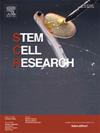Generation of two induced pluripotent stem cell lines from Lynch syndrome patients carrying heterozygous MLH1 mutations
IF 0.7
4区 医学
Q4 BIOTECHNOLOGY & APPLIED MICROBIOLOGY
引用次数: 0
Abstract
Lynch syndrome (LS), previously known as hereditary nonpolyposis colorectal cancer (HNPCC), is one of the most common hereditary cancer syndromes. LS is caused by a pathogenic mutation in one of the four DNA mismatch repair genes MLH1, MSH2, MSH6, or PMS2, or in EPCAM, which is upstream of MSH2. We generated two human induced pluripotent stem cell (iPSC) lines from LS patients carrying different single heterozygous missense mutations in the MLH1 gene. Pluripotency, morphology, karyotype stability, and differentiation capacity of both lines were normal. These patient-specific iPSC lines are a valuable tool to investigate LS phenotypes and develop potential therapeutics.
来自Lynch综合征患者携带杂合MLH1突变的两种诱导多能干细胞系的产生
Lynch综合征(LS),以前称为遗传性非息肉病性结直肠癌(HNPCC),是最常见的遗传性癌症综合征之一。LS是由四种DNA错配修复基因MLH1、MSH2、MSH6或PMS2中的一种或位于MSH2上游的EPCAM中的致病性突变引起的。我们从LS患者身上获得了两株人诱导多能干细胞(iPSC),它们携带不同的MLH1基因单杂合错义突变。两系的多能性、形态、核型稳定性和分化能力均正常。这些患者特异性iPSC系是研究LS表型和开发潜在治疗方法的有价值的工具。
本文章由计算机程序翻译,如有差异,请以英文原文为准。
求助全文
约1分钟内获得全文
求助全文
来源期刊

Stem cell research
生物-生物工程与应用微生物
CiteScore
2.20
自引率
8.30%
发文量
338
审稿时长
55 days
期刊介绍:
Stem Cell Research is dedicated to publishing high-quality manuscripts focusing on the biology and applications of stem cell research. Submissions to Stem Cell Research, may cover all aspects of stem cells, including embryonic stem cells, tissue-specific stem cells, cancer stem cells, developmental studies, stem cell genomes, and translational research. Stem Cell Research publishes 6 issues a year.
 求助内容:
求助内容: 应助结果提醒方式:
应助结果提醒方式:


